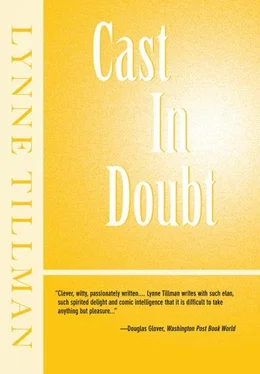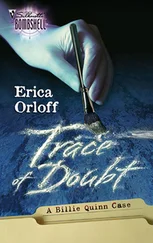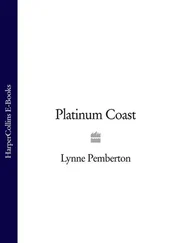What did we all hide? I remember dwelling on that perplexing question the whole hot summer after the grocer was incarcerated. I enjoyed taking long walks by myself in the woods, where I became fascinated with worms that crawled under rocks, with what might be hiding in the forest, banal experiences of that sort. And in my imagination Smitty the grocer was always somewhere nearby, a fantastic shape, a shadow hovering near a brook, and he was ready to pounce. Children have such vivid imaginations. It is a singular, exacting and herculean task of our society to damp those down, to tame children with ice-cream cones and dreary television. Helen thinks my ideas about what she calls pop culture entirely old-fashioned. Helen.
What I want to do most of all is to find Helen. I would be Stan Green were I able. And to find Helen, my Smitty, I did and do commit myself. Mentally, that is. I wished no one else to know of my quest, as I had concluded that I could not engage John in the adventure and was sure Gwen would try to put me off it. So I was to sleuth alone, and I was to begin at the beginning. I would go to Helen’s house, that is, Bliss’ house, and look for clues. For better or worse I am goal-directed.
With the goal tucked inside me, I walk determinedly to the open window through which the sun pours itself promiscuously into this room; its mission is natural, part of nature, and perhaps mine is too. I am watched by Yannis, who has often seen me walk to this very window. But he has no idea, of course, what’s in my mind. I look toward Helen’s terrace. There is no life there. Nothing stirs at Helen’s house, I announce in a stage whisper. I dress quickly, as if suddenly and urgently called to action, to move and to see for myself that rickety abode where Helen greeted and loved sailors and read books and made watercolors and wrote in her diary. I am thinking this as I pull on my tennis sneakers and throw over my shoulders a favorite cable sweater. Then, as if on a whim, I grab a sharp knife from the dining table. Yannis gives a yelp of surprise and moves to stop me, but I am determined, I suppose this is what I felt, to protect myself at all costs. None of this was conscious. Thought was liminal, a pink streak of light blushing in the sky after a crimson sun had disappeared.
Sometimes one advances toward a specific destination with not just a sense of purpose and direction, but with a sense of what to expect, and one progresses assured in the knowledge that the world one knows will be as one knows it and has always known it. When I walked to Alicia’s house the other week, I knew what I would find there. I did not know of course that her cheeks would be flushed or that she had sung to John, or for him, but I knew where her furniture would be and that her books would be on shelves; I knew how her paintings would be hanging, that there would be flowers in vases, and so on. I knew John might be there, and if he wasn’t I knew he would be on another day. One exists with the sense that life goes on in a regular manner, that one can breathe because one is meant to and air is air, that hello, yá sou, or bonjour will greet one, that fruit and vegetables will be sold where they were sold yesterday — in short, that one can recognize oneself in a recognizable world. And that much of life is ordinary. Even persons in concentration camps were able to adjust, over time, to the most horrific of circumstances, having come to know the routine, which was terrifyingly and mercilessly life as they were compelled by fate to know it, to live it, for however long.
As I walked to Helen’s house, I had lost this sense of assurance. I did not know what to expect, which alone unnerved me. I was already unnerved — or nervous — because I didn’t understand her disappearance, but when I imagined the consequences of this ignorance, I became confused. I had never even been inside her house. Years ago, when its owner Bliss was still in residence, I visited him there, but that was a long time ago. Much as I tried to envision Helen’s house, its contents, and to create it in advance of seeing it, I could not. I simply did not know what awaited me.
Now one may want to interject — part of me does — that I, Horace, sought to feel compassless, to experience the vertiginous highs and lows of the unexpected, having already insisted upon my pleasure in the unknown, having insisted upon how much I needed to invent my life, to make it closer to fiction. But I am a writer and given to such musings. One mustn’t believe everything one reads, after all.
But this one must, and I would implore one to, believe. The desire to invent is not what I felt. I felt without or separate from desire. Indeed I felt blank. I have never felt blank before in my life, yet this feeling which I do not know and do not recognize must be that; it is the only way I can express it. I have felt blotto, but not blank, at least not when conscious. I have been blind-drunk, deaf-drunk, dumb-drunk.
It is different today. I don’t know what to think. I imagine this is what Stephen the Hermit experiences with horrific consistency. He cannot turn on his electric lights, as his electricity has been shut off, and why this has happened — why something like electricity may be shut off — is incomprehensible to him, so he is forced to light candles and place them in tin cans, and he sits in his dimly lit room far from whatever he knew as a child in England or Italy, without secure thoughts to comfort him, disoriented, without thought at all perhaps; and he is blank, as empty as the proverbial unpainted canvas. Let me not bore you with such an image, though.
I was blank and yet I marched, in away even happily, toward Helen’s house. I have thought about this often since and decided, retrospectively, that I was emptying myself, though I did not know that at the time. I was not truly blank, I realize. Can one be? I was readying myself for an experience as fulgent as one of Blake’s epiphanous poems or paintings of such. Laugh if you will. But it seems to me now that I wanted to experience mystery and not just to write it.
On the way, quite near the harbor, actually just behind it, I pass a wake. The village style or ritual for death is to set a table or two outside the front door of the home of the bereaved upon which are placed flowers, a large basket of bread, and a tray of cakes, and above this hangs a piece of cloth, a tapestry, with a religious figure woven into it. The walls here are so old and crumbly that wakes are ancient and exotic tableaux and have an especial appeal to me. I believe it was the baker’s mother who died, though I am not sure. I did not take this as an omen since death here never takes a holiday; it is a most regular part of life. But as I remain a foreigner, I am uneasy in the face of it. I hate it. I despise death. It is the only natural aspect of life that I detest. Because I have no faith, Alicia would insist.
When I turn the corner and round the bend, to walk along the harbor, which is a singular joy, always and in all situations beautiful — it never fails to surprise and delight me, even now, as anxious as I am — I spy Gwen sitting at a table in front of the restaurant. Were it not for my alertness, I might have come face-to-face with her. She is at my restaurant, seated at my table, looking at my harbor, but looking at the water and the scene with her look on her face, that inimitable expression. From the way in which she is sitting, so relaxed, it is now her restaurant as much as mine. Dear, dear Gwen, how quickly she takes possession — of me, too, for how can I not talk to her, yet how would I tell her where I actually was intending to go when I do not want her to know. I do not want her advice. So I rush on as if I had not seen her and madly hope, hope jarring hope, that she has not seen me. Her look of concentration is unbroken; so great is it, quite likely she has not noticed me. I decide she has not, and even if she has, she hasn’t made contact with me, and I have a right to be miffed, if I am. I’m not. In fact I hope she will be just where she is after I have finished my business at Helen’s house. For who knows, I think to myself, again and again, what I will find there?
Читать дальше












